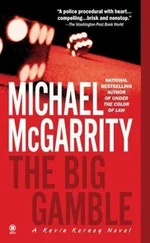Michael Mcgarrity - Slow Kill
Здесь есть возможность читать онлайн «Michael Mcgarrity - Slow Kill» весь текст электронной книги совершенно бесплатно (целиком полную версию без сокращений). В некоторых случаях можно слушать аудио, скачать через торрент в формате fb2 и присутствует краткое содержание. Жанр: Триллер, на английском языке. Описание произведения, (предисловие) а так же отзывы посетителей доступны на портале библиотеки ЛибКат.
- Название:Slow Kill
- Автор:
- Жанр:
- Год:неизвестен
- ISBN:нет данных
- Рейтинг книги:3 / 5. Голосов: 1
-
Избранное:Добавить в избранное
- Отзывы:
-
Ваша оценка:
- 60
- 1
- 2
- 3
- 4
- 5
Slow Kill: краткое содержание, описание и аннотация
Предлагаем к чтению аннотацию, описание, краткое содержание или предисловие (зависит от того, что написал сам автор книги «Slow Kill»). Если вы не нашли необходимую информацию о книге — напишите в комментариях, мы постараемся отыскать её.
Slow Kill — читать онлайн бесплатно полную книгу (весь текст) целиком
Ниже представлен текст книги, разбитый по страницам. Система сохранения места последней прочитанной страницы, позволяет с удобством читать онлайн бесплатно книгу «Slow Kill», без необходимости каждый раз заново искать на чём Вы остановились. Поставьте закладку, и сможете в любой момент перейти на страницу, на которой закончили чтение.
Интервал:
Закладка:
Within the private holdings were the remnants of ancient Indian pueblos, petroglyphs etched on massive rock outcroppings, ruins of early Spanish sheep camps, caves with painted pictographs, and abandoned farmsteads rarely viewed by outsiders. Kerney had been fortunate enough to see many of the sites during the times he’d participated in gathering cows on the neighboring ranches during spring and fall works.
A village of several hundred people, Galisteo still retained the look and feel of a Spanish settlement. Tall cottonwoods spread thick branches over high adobe walls, and dirt lanes wound past flat-roofed haciendas and veered away from the deep channel of the small river, in truth no more than a stream, that defined the eastern boundary of the settlement. A small distance beyond the village stood a narrow old highway bridge with concrete railings, and beyond that were the rodeo grounds, consisting of a fenced arena and corrals, where every summer working cowboys from the basin gathered for a weekend of friendly competition.
An adobe church with stone buttresses and rows of narrow, tall windows defined the center of the village, fronting a two-lane state road that crossed the bridge and wandered up grassland hills to Comanche Gap, an ancient route once used by Plains Indians to raid nearby pueblos. Across the road from the church was a small general store with turquoise-blue wood trim, earthy peach plastered walls, and a hand-painted sign that advertized homemade tacos. To the rear of the church, away from the lush tree cover by the river, was a scattering of more modest houses and a cemetery on a rocky knoll.
There were a few businesses in and around the village, but they were not the usual array of gas stations, diners, and motels found in small towns. There was a bed-and-breakfast inn with an excellent restaurant, a riding and horse-boarding stable, an herbalist’s shop, an upscale spa resort, a new age spiritual awareness center, and of course the Stover-Driscoll Gallery, which had to be somewhere nearby.
Kerney stopped at a lighted house behind the church to ask where the gallery was, and was directed to the old territorial-style schoolhouse on the county road that cut west toward the Cerrillos Hills.
Two cars were parked in front, and warm light poured out into the silvery night through the tall, open windows. From deep inside came the soft sounds of a piano sonata. Kerney’s heavy knock on the original double doors brought a quick response by a woman whose expression of anticipation changed to one of surprise.
She was dark-haired with widely spaced eyes and a softly rounded face that matched the attractive curves of her frame. The plain gold band on the ring finger of her left hand signaled to Kerney that if she was indeed Jennifer Stover, she had remarried.
“Are you Jennifer Stover?” Kerney asked, after introducing himself.
“I am,” Stover said. “I’m sorry I reacted the way I did. I thought you were Dennis and Marie.”
“There’s no cause to apologize,” Kerney said. “Have I come at a bad time?”
Stover stepped back and motioned Kerney to enter. “I can spare a few minutes.”
“That’s all I need.”
The inside guts of the schoolhouse lobby had been ripped out, enlarged, and renovated, creating a great room of considerable size that spanned the width of the building. Thick posts and beams had been installed to bear the weight of the roof, a rectangular stone fireplace had been added along one wall, and the old oak floors gleamed with a satiny patina.
A fluffy, overweight cat scurried past Kerney’s feet and out the open door. Five seating areas filled the room, each large enough to accommodate six to eight people, strategically arranged for viewing the artwork on the walls, all of it modern, abstract, large canvases.
“I’m looking for an employee,” Kerney said, “who once worked in your Canyon Road gallery. Her first name is Helen.”
Stover smiled. “Helen Randell is my partner.”
“Can you put me in touch with her?” Kerney asked.
“She’s my partner in life as well as business,” Stover added without hesitation. “Why do you need to speak with her?”
“I’m looking for someone she knew a long time ago, and I hope she might be able to help me.”
“She’s in the kitchen. Follow me.”
Stover led Kerney to a converted classroom off the great room, where Randell stood at a counter in front of a bank of kitchen cabinets. Tall, with curly golden hair, she turned when Stover called her name.
“Who do we have here?” she asked, eyeing Kerney.
“A police officer who is trying to find someone,” Stover replied.
“Has someone we know gone missing?”
“Debbie Calderwood,” Kerney said.
Randell laughed. “Isn’t it odd that you can go for years without ever thinking about or seeing someone and then suddenly they repeatedly reappear in your life, one way or another? Debbie is hardly missing, at least not anymore.”
“You’ve seen her or heard from her?”
Randell nodded. “Less than a month ago, at the opera. I was standing in line at the bar before the performance getting drinks and Debbie was right in front of me. At first I didn’t recognize her, but it was Debbie.”
“You know that for sure?”
“Of course. We talked.”
“What did you talk about?” Kerney asked
“We caught up briefly with each other. She’s living in Calgary, Canada, and is married to a man who runs a philanthropic foundation of one sort or another.”
“Did she tell you her married name?”
“No, we didn’t talk for very long.”
“Was she with her husband?”
“She didn’t say, and I didn’t see anyone with her. She did mention that it was her first trip back to New Mexico since she’d moved to Canada many years ago. From the way she was dressed and the jewelry she wore, she’s been living very well up there.”
“Does the name George Spalding ring a bell?”
“He was her high school boyfriend. In the Army at the time. She didn’t really talk about him much, especially after she got involved in the free speech movement.”
“Did you exchange addresses?”
Randell shook her head. “No. It was a rather awkward encounter. Even though we were college room-mates for a time, we weren’t that close, and Debbie didn’t seem interested in chatting.”
“Would you be willing to work with a police sketch artist so we can create a likeness of Debbie?”
“If it’s important,” Randell said.
Kerney handed Randell his business card. “It is. Call my office in the morning and I’ll set up an appointment for you.”
Randell slipped the card into a pocket of her slacks. “Why are you trying to find Debbie?”
“In order to find someone else,” Kerney replied.
A knock at the front door ended the conversation, but Kerney had learned far more than he’d hoped for. He thanked the women for their time, made his way past their arriving guests, and drove home, eager to call Sara and learn what she might have gleaned from George Spalding’s military records.
In the living room with the dim light of a single table lamp turned down low, in a house almost always much too empty and quiet, Kerney phoned Sara.
“I was hoping you’d call,” she said.
“I wanted to apologize again,” Kerney said, “for being so pushy.”
“There’s no need. What happened yesterday is over and done with, and I’ve got other things on my mind.”
“Like what?
“I’ve just been handed a major project, an important one, and it’s a mess.”
“Can you talk about it?”
“If members of Congress can, I guess I can too. A number of female soldiers from the enlisted and officer ranks have come forward with charges of sexual assaults that have gone unpunished or not yet been brought to courts-martial. They’re claiming shoddy, flawed investigations, unacceptable leniency for offenders, and inadequate victim services.”
Читать дальшеИнтервал:
Закладка:
Похожие книги на «Slow Kill»
Представляем Вашему вниманию похожие книги на «Slow Kill» списком для выбора. Мы отобрали схожую по названию и смыслу литературу в надежде предоставить читателям больше вариантов отыскать новые, интересные, ещё непрочитанные произведения.
Обсуждение, отзывы о книге «Slow Kill» и просто собственные мнения читателей. Оставьте ваши комментарии, напишите, что Вы думаете о произведении, его смысле или главных героях. Укажите что конкретно понравилось, а что нет, и почему Вы так считаете.












